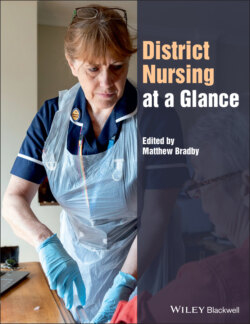Читать книгу District Nursing at a Glance - Matthew Bradby - Страница 18
Оглавление6 Mentorship and preceptorship
Meriel Chudleigh, QN
Figure 6.1 Community preceptorship and mentorship.
Nursing is changing and the expectations of service users, healthcare professionals and society are rising. The demographic need and demand for ‘care closer to home’ is driving a move to minimise hospital contact and optimise community health support. Undergraduate nursing students spend significant amounts of mentor‐supported practice time in community settings to prepare them for these challenging and rewarding roles. From the point of registration, all healthcare professionals are autonomous, accountable practitioners, but the first weeks and months in a community role are aided by the support of experienced colleagues, either informally or through preceptor or mentor facilitation (Figure 6.1).
Preceptorship
A preceptee is a registered healthcare practitioner entering a new community role, supported by the formal process of preceptorship. A preceptee could be a newly qualified registrant, a professional returning to registration following a break in practice, a nurse entering a new part of the Nursing and Midwifery Council (NMC) register, or an overseas nurse starting a role in the UK.
A preceptor is a formally responsible nurse (on the same part of the NMC register) supporting a preceptee through role modelling, facilitating of learning and guidance throughout the community preceptorship. Effective preceptors are experienced peers with leadership and communication skills and a desire to support professional development.
A preceptorship involves a formal transition period of supported learning and may involve some supernumerary time. It may last from two weeks to four months or more, depending on the situation and needs of the preceptee. The aim of the preceptorship is to develop the competence and confident of the preceptee. An initial set of objectives provides a planning focus and frequent contact between preceptee and preceptor occurs, particularly during the first weeks. Contacts may involve discussion to optimise action plans, reflection on practice and receiving feedback on progress. The preceptorship may involve additional skills training: time shadowing a role model, observation of practice, clinical supervision and activities to integrate the preceptee into the primary care multidisciplinary team. Structured learning opportunities in groups or online alongside one‐to‐one contact with the preceptor enables optimal progress and effective use of resources.
The preceptor also benefits from the experience in facilitating community staff development, progress in lifelong learning and evidence to aid career progression. Both preceptor and preceptee gain from the relationship; however, it requires the development of trust, reflective skills and honesty to use the opportunity to its full potential.
Employing organisations are responsible for implementing and supporting preceptorship frameworks, including learning objectives and competencies appropriate to the role. Preceptorship is considered to be separate from organisation induction processes and mandatory certification. Employers benefit from preceptorships too, through increased staff satisfaction, role competence and confidence, and improved community staff retention.
Mentorship
Mentorship is a two‐way relationship intended to support, develop and assess learning in practice and individual personal and professional development.
A mentor is an expert or experienced practitioner who is either selected by the mentee or allocated to the mentor role of facilitator and in some circumstances as assessor. A mentee is a person requiring support and supervision to aid personal and professional development. The NMC requires an allocated registered mentor to support and assess undergraduate students during each practice placement. During the final pre‐registration placement a skilled and responsible ‘sign off’ mentor assesses competence and confirms that the applicant is professionally ready to join the register.
Other less formal mentorship roles are also present in UK community healthcare and these offer both the ‘mentee’ and the ‘mentor’ development opportunities. Mentorship may be required to fulfil certain course or role requirements, or help develop leadership, management, advanced practice, research or teaching abilities. Learning in practice involves internal personal change and the mentor initially provides support and guidance, leading gradually to increasing role competence and confidence. A dynamic relationship develops between mentor and mentee arising from regular contact and focussed discussion of needs, concerns and interests.
Initially, a mentee will be in a dependent position but this should develop (particularly in post‐registration situations) to a more equal professional relationship with mutual beneficial growth. A critical friendship can develop the relationship further to enhance the opportunity to challenge practices and values, stimulate healthy discussion and drive innovative progress.
In community settings, mentorship has particular relevance due to the potential challenges of working alone in patient’s own homes or in roles where more autonomy is required. Dealing with uncertainty and making safe independent clinical management decisions involves understanding the complex interaction of physical, social and psychological aspects of care. This exposure to new learning experiences drives emotional and professional development. The interpersonal skills of the mentor are important to the success of the relationship and the optimal use of the opportunity. Ultimately both the mentor and mentee come through a process of change and are better equipped to understand the challenges and opportunities of community healthcare.
